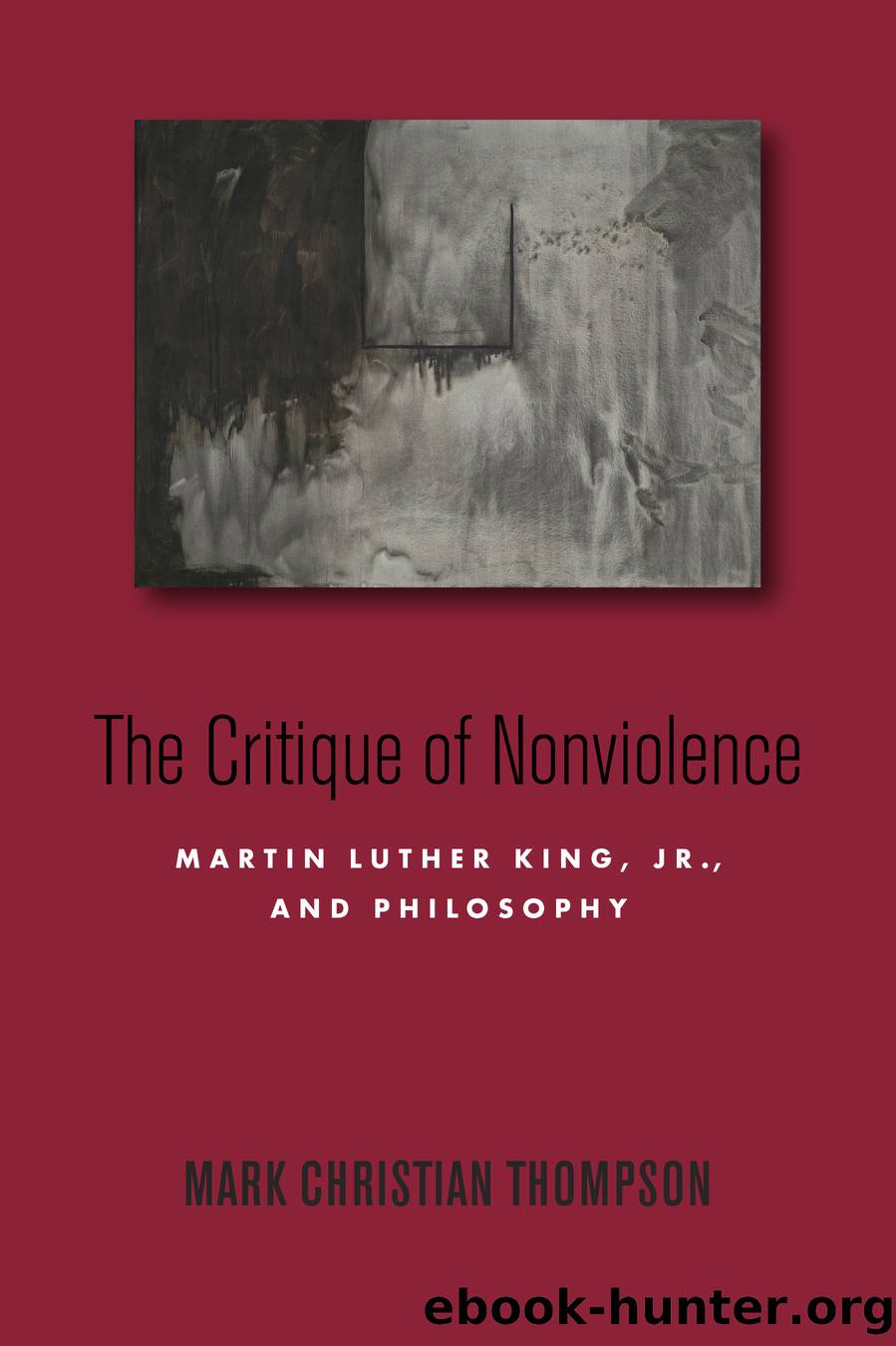The Critique of Nonviolence by Mark Christian Thompson

Author:Mark Christian Thompson
Language: eng
Format: epub
Publisher: Stanford University Press
Published: 2022-01-15T00:00:00+00:00
5
Divine Nonviolence
I. Kingâs Political Theology
ESCHATOLOGICAL MESSIANISM PLAYS critical roles in Kingâs own philosophy. âJustice too long delayed is justice deniedâ and âan unjust law is not law at allâ become the operative axiomatic expressions guiding the eschatological-messianic logic of Kingâs âLetter.â Each maxim helps to establish the fact that justice above all is paramount in considering the validity of civil disobedience and the extent to which it can be considered an infraction against the legal order and the cause of a fracture in a just society. Kingâs first quote comes from a renowned jurist, and the second is from Saint Augustine. Both axioms understand the situation of revolt as one sanctioned not by positive law but rather by those precepts of a higher power. In the case of Augustine, deference is justly paid to divine law over that of the state, and in the instance of Supreme Court justice, King wishes to posit the priority of federal law over that of the states, whose local judicial rulings are vacated by the authority of the high court. In a sense, in setting these very similar quotes near each other, King runs the risk of achieving a contradictory rhetorical end. For in so doing, his text aligns the Supreme Court with divine law, and state law with its imperfect positive expression. In other words, King allows for the possibility of divine political order on earth and without need of police. Indeed, the existence of the police indicates the stateâs failure qua state.
King writes:
A just law is a man-made code that squares with the moral law or the law of God. An unjust law is a code that is out of harmony with the moral law. To put it in the terms of St. Thomas Aquinas: An unjust law is a human law that is not rooted in eternal law and natural law. Any law that uplifts human personality is just. Any law that degrades human personality is unjust. All segregation statutes are unjust because segregation distorts the soul and damages the personality. It gives the segregator a false sense of superiority and the segregated a false sense of inferiority. Segregation, to use the terminology of the Jewish philosopher Martin Buber, substitutes an âI-itâ relationship for an âI-thouâ relationship and ends up relegating persons to the status of things. Hence segregation is not only politically, economically and sociologically unsound, it is morally wrong and sinful. Paul Tillich has said that sin is separation. Is not segregation an existential expression of manâs tragic separation, his awful estrangement, his terrible sinfulness? Thus it is that I can urge men to obey the 1954 decision of the Supreme Court, for it is morally right; and I can urge them to disobey segregation ordinances, for they are morally wrong. (King 2011, 93)
Citing Aquinas indirectly, King insists that any just manifestation of positive law must correspond to its expression in and as natural law, where nature reflects the moral order as decreed by God in His essence. The
Download
This site does not store any files on its server. We only index and link to content provided by other sites. Please contact the content providers to delete copyright contents if any and email us, we'll remove relevant links or contents immediately.
Chaco's Northern Prodigies : Salmon, Aztec, and the Ascendancy of the Middle San Juan Region after AD 1100 by Paul F. Reed(379)
Digital International Relations by Unknown(375)
Law Enforcement Interpersonal Communication and Conflict Management by Brian Douglas Fitch(365)
Skilled interpersonal communication: Research, theory and practice, Fifth edition by Owen Hargie(355)
The Enduring Color Line in U.S. Athletics by Krystal Beamon Chris M. Messer(353)
Critical Perspectives on Human Security : Rethinking Emancipation and Power in International Relations by David Chandler; Nik Hynek(341)
EPSO CAST Political affairs EU policies: How to succeed in the selection procedure by Franco Reverte José María(329)
Evidence-Based Policy Making in Labor Economics by Hamermesh Daniel S.;Nottmeyer Olga K.;Nottmeyer Olga;King Sarah;King Sarah;King Sarah;(319)
Writing Public Policy - A Practical Guide to Communicating in the Policy Making Process by Catherine F. Smith(297)
Criminological Theory in Context by John Martyn Chamberlain(294)
Rothschild and Early Jewish Colonization in Palestine (Geographical Perspectives on the Human Past) by Ran Aaronsohn(292)
Positive Psychology and Spirituality in Counselling and Psychotherapy (Conflict, Ethics, and Spirituality, 12) by unknow(289)
Tibeton Yoga Its Secret Doc by Evans-Wentz(283)
Threshold Concepts in Women's and Gender Studies by Christie Launius Holly Hassel(279)
Social Problems, Social Issues, Social Science by James Wright(278)
Cognitive Development in Infancy and Childhood (Elements in Child Development) by Mary Gauvain(273)
Play in child development and psychotherapy: toward empirically supported practice by Sandra W. Russ(272)
Latin American Politics and Society by Gerardo L. Munck & Juan Pablo Luna(252)
The Arab Spring Abroad: Diaspora Activism against Authoritarian Regimes by Dana M. Moss(234)
